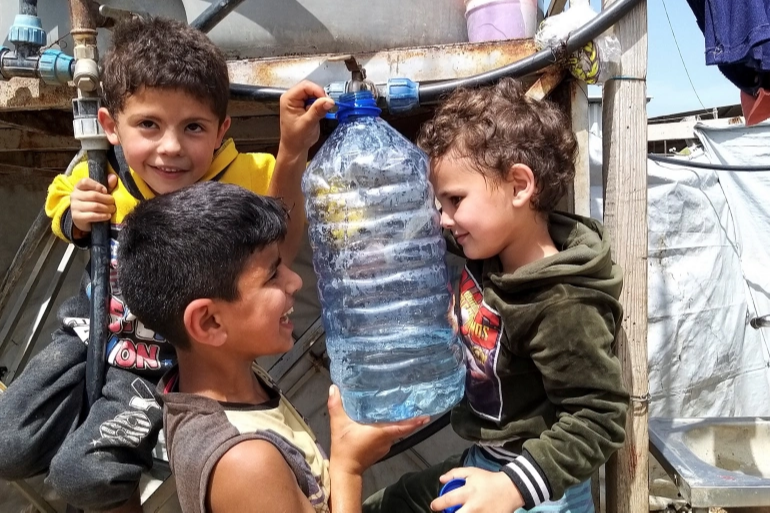
A Syrian refugee child holds a water bottle at an informal tented settlement in Akkar, Lebanon [File: Walid Saleh/Reuters]
Beirut, October 20 (RHC)-- Lebanon has warned that a deadly cholera outbreak is “spreading rapidly”, with cases rising after the virulent disease spread from neighbouring Syria. The outbreak in the economically devastated country, which has left at least five dead, is the first since 1993. Health officials have blamed the country’s financial and political struggles, which have left citizens with poor and crumbling sanitation infrastructure.
“The epidemic is spreading rapidly in Lebanon,” caretaker Minister of Public Health Firass Abiad told reporters on Wednesday. Since October 6, Lebanon has recorded 169 cholera cases, almost half of them in the past two days, according to the health ministry.
The latest crisis comes after three years of unprecedented economic dire straits in Lebanon and the inability to control porous borders with neighbouring war-torn Syria, where an outbreak is spreading after more than a decade of war.
Abiad said the first case in Lebanon was recorded on October 5 in the rural northern Lebanese region of Akkar and that the patient, a Syrian national, was receiving treatment and in stable condition. He added that, while the “vast majority” of cases were Syrian refugees, health officials “have started to notice an increase in cases among the Lebanese.”
Lebanon hosts more than one million Syrian refugees, many of them already poverty-stricken and living in crowded camps for the displaced that lack running water or sewage systems – well before Lebanon’s economic collapse began.
“The lack of sanitation makes crowded camps high-risk areas,” said Al Jazeera’s Zeina Khodr, reporting from Akkar in Lebanon. “Cases are no longer confined to camps bordering Syria, but they’ve since spread to poor areas where drinking water is widely polluted and at times, mixed with wastewater.”
Cholera is generally contracted from contaminated food or water, and causes diarrhoea and vomiting. It can also spread in residential areas that lack proper sewage networks or drinking water from mains. Abiad said that contaminated water was used for farming, spreading the disease on to fruit and vegetables.
Lebanon’s water infrastructure is also derelict and the healthcare system has been hit hard by a three-year financial crisis and the August 2020 Beirut port blast that destroyed critical medical infrastructure in the capital. Despite humanitarian aid from donor countries, Abiad said the sector would struggle to cope with a large-scale outbreak.
The Euphrates River is believed to be the source of Syria’s first waterborne disease outbreak since 2009, but cholera has since spread nationwide, with thousands of suspected or confirmed cases reported. According to the United Nations, nearly two-thirds of water treatment plants in Syria, half of pumping stations and one-third of water towers have been damaged.
Meanwhile, the World Health Organization and its partners have recommended that countries temporarily switch to using a single dose of the cholera vaccine instead of two due to a supply shortage as outbreaks surge globally.
In a statement on Wednesday, the UN agency and partners that include UNICEF and the International Federation of Red Cross and Red Crescent Societies said one dose of vaccine has proven effective in stopping outbreaks “even though evidence on the exact duration of protection is limited” and appears to be lower in children.
WHO Director-General Tedros Adhanom Ghebreyesus has warned that outbreaks in 29 countries this year were putting “unprecedented pressure” on the world’s limited vaccine supply. He said authorities should aim to scale up vaccine production and that “rationing must only be a temporary solution.”
Cholera can kill within hours if left untreated, according to the WHO, but many of those infected will have no or mild symptoms. It can gernally be easily treated with oral rehydration solution, but more severe cases may require intravenous fluids and antibiotics, the WHO has said.
Worldwide, the disease affects between 1.3 million and four million people each year, killing between 21,000 and 143,000.

